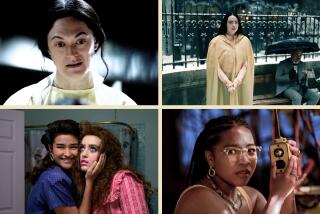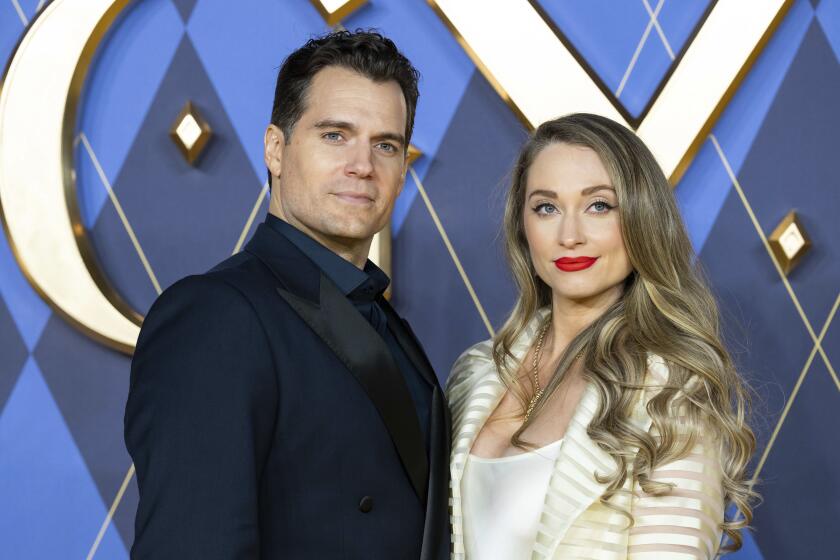Indie Focus: Cycles of birth and death in ‘Prevenge,’ ‘Frantz’ and ‘Life’
Hello! I’m Mark Olsen, and welcome to another edition of your regular field guide to a world of Only Good Movies.
With the recent Oscar wins for Barry Jenkins’ “Moonlight” and the box office success for Jordan Peele’s “Get Out,” this feels like a revitalized moment for African American cinema. But what of those same movies when they move beyond the shores of the U.S.? There has been a long-standing industry axiom that “black films don’t travel,” that movies by and about African Americans don’t do well overseas.
The Times’ Tre’vell Anderson has dug deep to disprove that notion, with an article that delves into where that myth may have originated and why it doesn’t represent the international box office possibilities for movies not only like “Get Out” or “Moonlight,” but for loads of other films such as “Hidden Figures” or “Straight Outta Compton” too.
“The next frontier is finally blowing up this myth,” filmmaker Reginald Hudlin said. “A lot of movies don’t travel, unless they do.”
We have two exciting screenings coming up, with Marc Webb’s “Gifted” on March 30 and James Gray’s “The Lost City of Z” on April 3. These both will be very fun events. Keep on the lookout for updates at events.latimes.com.
‘Prevenge’
Female filmmakers shooting their movies while pregnant is a story that has surprised me every time I have heard it. British writer and performer Alice Lowe — perhaps best known for co-writing and co-starring in Ben Wheatley’s “Sightseers” — makes her feature debut as director with “Prevenge,” which she also wrote and stars in. In the film, shot while Lowe was indeed herself pregnant, Lowe plays a pregnant woman who goes on a murder spree when the baby growing inside her begins to speak to her, instructing her to kill.
Reviewing the film for The Times, Noel Murray wrote, “While the plot is skimpy, the performances are rich, which turns ‘Prevenge’ into a series of satirical sketches, dissecting the social dynamics between a mother-to-be and the various men and women who think they have an advantage over her. … Fans of Lowe’s prior work should be thrilled to see such a distilled dose of her perverse humor. Her take on humanity is empathetic — in the way that only a raging misanthrope can be.”
Vulture’s Emily Yoshida added: “ ‘Prevenge’ also suggests a wealth of possibility for pregnancy horror as a subgenre, decades after ‘Rosemary’s Baby.’ Were we really going to let a male filmmaker have the last word on the implications of a little mystery person growing inside your own body? It seems it’s only just begun gestating.”
As the New York Times’ Jeannette Catsoulis put it, “At its core, though, ‘Prevenge’ is a brilliantly conceived meditation on prepartum anxiety and extreme grief. … Ms. Lowe makes Ruth a deeply conflicted avenger. You’ll laugh, you’ll squirm, you’ll want to get sterilized immediately.”
And Lowe appeared on Sam Fragoso’s podcast “Talk Easy.”
I also interviewed Lowe while she was in Los Angeles recently, taking meetings around town with her now infant daughter in tow. I’ll be publishing something from our conversation soon.
‘Frantz’
French filmmaker François Ozon, still best known for his 2003 film “Swimming Pool,” is extremely prolific, which also makes him something of a conundrum, as his work is so varied from movie to movie it not only can be hard to keep up but also near impossible to find a typical through line connecting everything. Take for example Ozon’s new “Frantz,” starring Pierre Niney and Paula Beer and based on Ernst Lubitsch’s 1932 World War I-set film “Broken Lullaby.”
In reviewing the film for The Times, Justin Chang noted a character’s “bracing mix of clever calculation and pure instinct” before adding, “Something similar might be said of Ozon, whose work often attempts — not always successfully, but always impressively — to bridge the gap between style and feeling, between his flair for formal trickery and his desire to usher the viewer into a realm of unbridled emotion.”
At the New York Times, Stephen Holden wrote, “For an antiwar film, ‘Frantz’ is low-key. It doesn’t rub your face in gore or stir your adrenaline; there are no battle scenes, and only fleeting images of ruined cities and wounded soldiers; and a mood of bitterness, despair and exhaustion prevails.”
Speaking to Eric Kohn at IndieWire, Ozon said of his productivity, “I try not to repeat myself. I try each time to have a new challenge, because it takes a lot of energy to make one film a year. [Rainer Werner] Fassbinder was able to make seven films a year. He died when he was 49. I’m still alive. One film per year is enough.”
‘Life’
A sci-fi horror thriller hybrid, “Life” stars Jake Gyllenhaal, Rebecca Ferguson and Ryan Reynolds as part of a team of astronauts trying to grapple with the discovery of a life-form in a soil sample from Mars. When that small sample grows and grows into a dangerous creature, things take a real turn.
In his review for The Times, Kenneth Turan said of the film that it “is efficiently constructed to unsettle audiences. It demonstrates both the pleasures and the limitations of doing a skillful job with familiar genre material.”
I spoke to some of the team behind the film, including director Daniel Espinosa, screenwriters Rhett Reese and Paul Wernick and producer David Ellison. As Wernick said, “What better haunted house in the entire universe than the International Space Station, 200 miles above Earth.”
At Vanity Fair, Richard Lawson added, “A lot of ‘Life’ is difficult going if you’re averse to bugs, body stuff, claustrophobia, the punishing inhospitality of space, etc. But Espinosa’s artful touch tempers that discomfort. ‘Life’ is tense and unnerving and a total bummer. But it’s still worth it. And no, I don’t know if I’m talking about ‘Life’ or life anymore either.”
And in one of the more unusual recent profiles you are bound to read, Tim Jonze spoke to Gyllenhaal for the Guardian and, well, it took a turn when the actor bristled at questions he felt were too personal.
“I had the privilege to meet President Obama,” Gyllenhaal said, “and he told me: ‘You have a job as an artist to help people through difficult times, to illuminate things through art.’ He said: ‘That’s your job.’ And my parents have always said that, too. And I’m sure you know it, because you seem like a very smart person who has done their research, particularly into tabloid research, which is obviously the most important of all research.”
Email me if you have questions, comments or suggestions, and follow me on Twitter@IndieFocus.
More to Read
Only good movies
Get the Indie Focus newsletter, Mark Olsen's weekly guide to the world of cinema.
You may occasionally receive promotional content from the Los Angeles Times.







